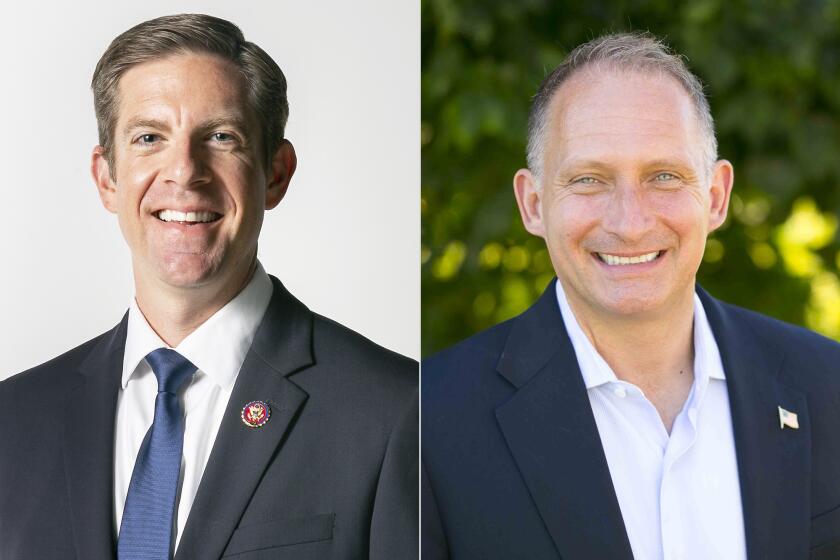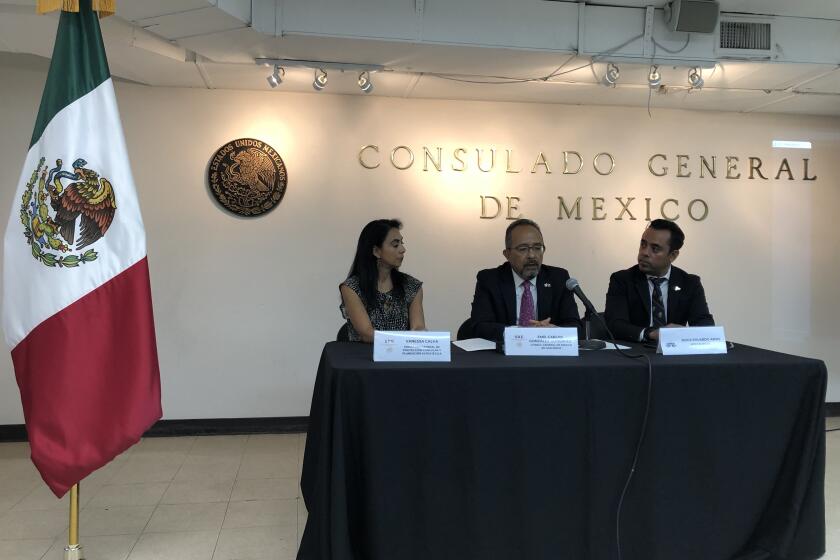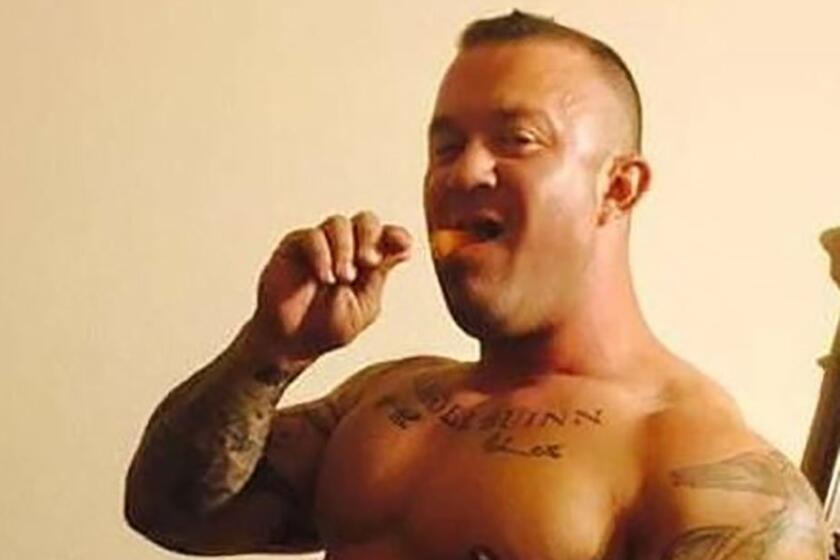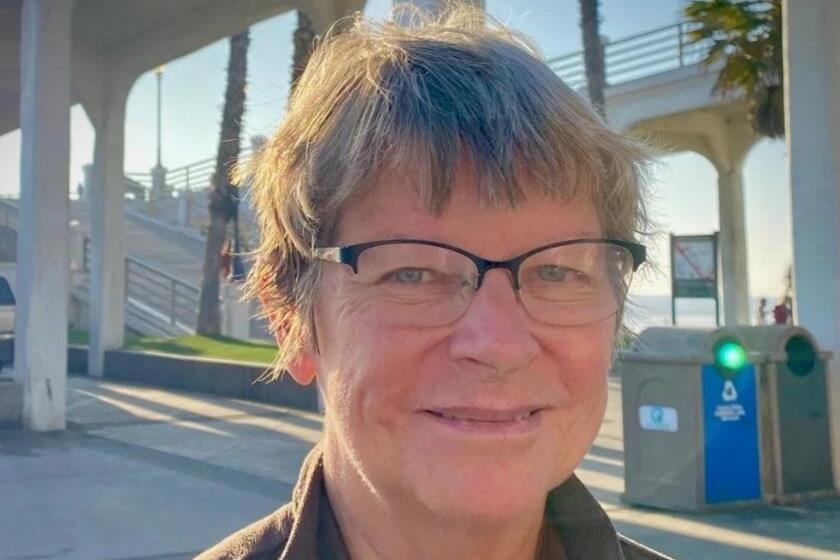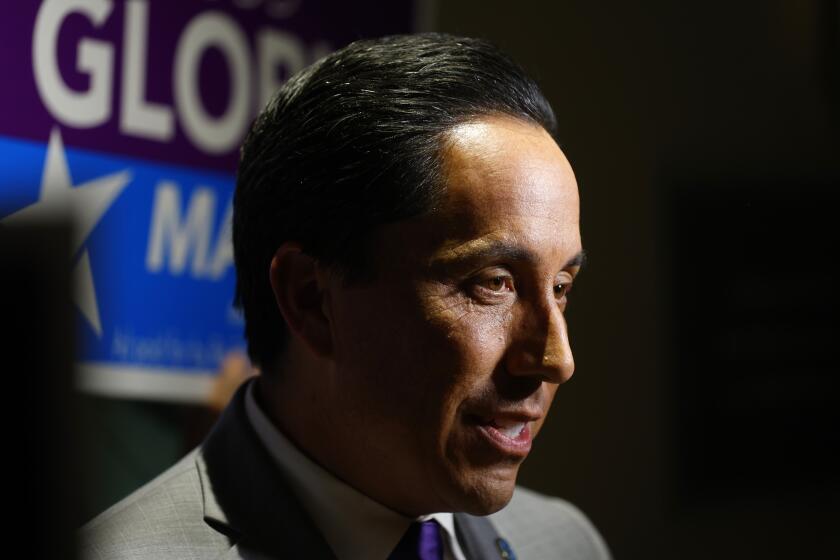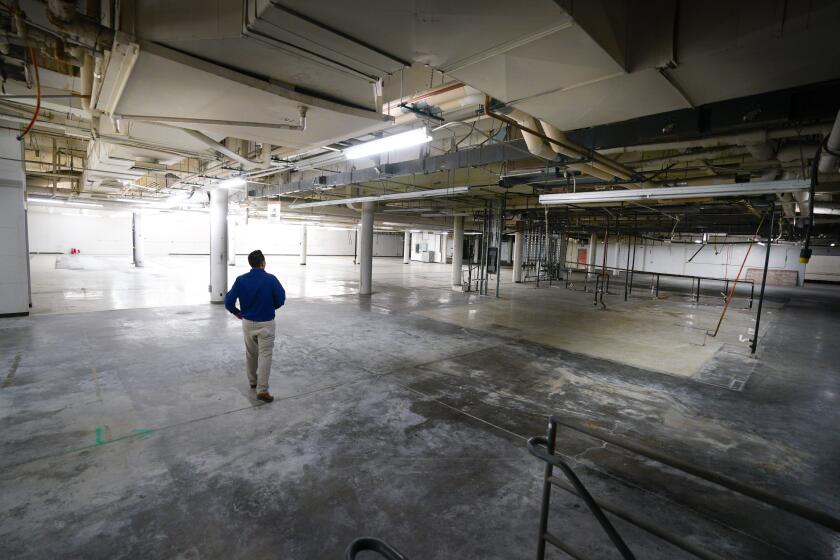Rep. Hunter enters plea in federal campaign finance case, telling judge, ‘Guilty’
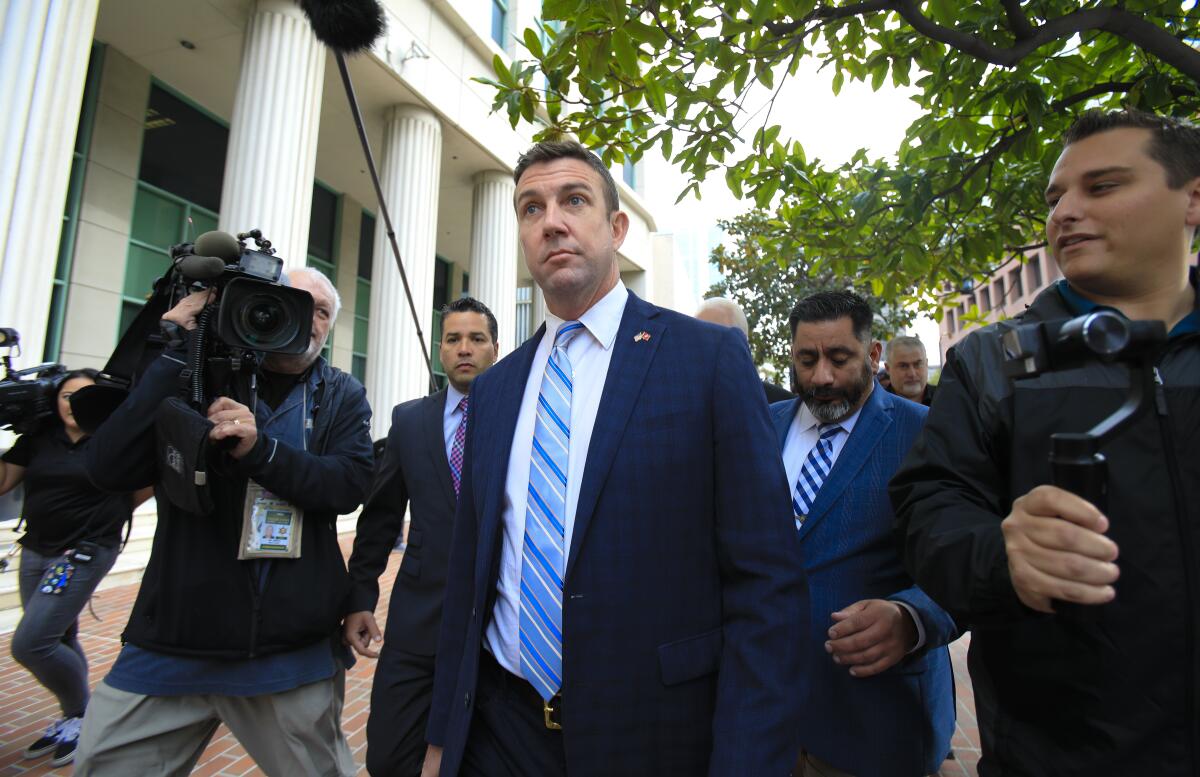
Admission comes after East County Republican accused prosecutors of engaging in political witch hunt
The campaign finance prosecution against Rep. Duncan Hunter took a momentous turn Tuesday as the Republican congressman from Alpine admitted criminal wrongdoing in a guilty plea that effectively ends his political career and positions him for the possibility of prison.
In a hearing that lasted no more than seven minutes, Hunter admitted to a single count of conspiracy to convert campaign funds to personal use. In doing so, prosecutors have agreed to drop the other 59 counts against him.
When U.S. District Court Judge Thomas J. Whelan asked how he now pleaded, Hunter answered, “Guilty.” Hunter said little else during the hearing.
His comments were similarly brief to a swarm of reporters on the courthouse steps outside. He pointed to a full interview he provided local television station KUSI the day before, and added: “I failed to monitor and account for my campaign spending. I made mistakes, and that’s what today was all about.”
Prosecutors countered that Hunter’s behavior amounted to more than simple mistakes.
“This is not a case about mismanagement or accounting errors or mistakes,” said Assistant U.S. Attorney Emily Allen.
She added: “While this crime may not involve allegations of cash bribes, make no mistake, it is corruption all the same.”
Hunter’s admission of guilt leaves open to speculation what will happen to his 50th Congressional District seat.
Hunter declined to confront the question of resignation head on, saying only, “I’ll have more statements in the future about the future.”
Prosecutors said outside the courthouse that Hunter was not required to resign as part of his plea deal but they understood from the defense team that he would be stepping down soon. No timeline was provided.
As Hunter walked away from the courthouse, his father, the former longtime congressman also named Duncan Hunter, told a reporter that resignation would be discussed soon with the House Republican leader Rep. Kevin McCarthy and Speaker Rep. Nancy Pelosi.
“He’s got to talk to them about their ideas about what they want him to do in terms of the transition,” the elder Hunter said.
Hunter faces up to five years in prison when he is sentenced, but he is likely to receive much less time behind bars. Prosecutors said they would likely advocate for a term of more than one year in prison, but an exact recommendation has not yet been decided.
In the plea agreement, the prosecution and defense agreed on certain elements that will help calculate a sentencing guideline range, accounting for Hunter’s military service and wartime deployments, as well as his “medical history, his role in the offense, his family circumstances and other personal characteristics warranting a reduced sentence.”
Those are only recommendations, and the decision will ultimately lie with the judge. The sentencing hearing has been set for March 17, although it is not uncommon for sentencing dates to be pushed back.
Prosecutors said the guilty plea would have no effect on the plea agreement that the congressman’s wife and co-defendant Margaret Hunter reached earlier this year.
Assistant U.S. Attorney Phillip Halpern emphasized that the conspiracy charge that Hunter pleaded guilty to encompasses the totality of the criminal conduct alleged in the case and said additional counts would not have affected his sentence.
Halpern commended Hunter’s military service and contribution as a member of a family political dynasty.
“He has, in fact, dedicated much of his life representing the people of this nation,” Halpern said. “Yet it is the very foundation of our system of law that no one — no one — is above it.
“No figure regardless of the heights they’ve reached, no figure regardless of what they’ve contributed, no figure regardless of what office they occupy, should be allowed in this country to cry ‘witch hunt’ or ‘fake news’ in an attempt to deflect their criminal wrongdoing,” Halpern said.
Hunter had used those same words to describe the allegations against him, claiming at one point that federal prosecutors were out to get him for being one of the earliest supporters of President Donald Trump.
The plea agreement tells a different story.
In it, he confessed to knowingly and willfully converting campaign funds to personal use in amounts greater than $25,000 or more during a calendar year. The admission of $25,000 or more is significant because it exposes the defendant to a longer prison term.
The agreement also stipulates that Hunter began using campaign funds improperly “no later than 2010,” meaning barely a year after he arrived in Congress. The criminality continued to at least 2016, it adds.
Also, “there was an agreement between Hunter and Margaret Hunter” to misuse campaign funds, the agreement said.
In the deal with prosecutors, Hunter admitted that in August 2011 he spent $511 in campaign funds at the Hotel Del Coronado to take his wife and children out to celebrate his daughter’s birthday.
“To conceal and disguise these personal charges, (Hunter) falsely informed his treasurer that all the charges were ‘campaign related,’” according to the agreement.
Hunter also admitted to a second overt act: spending $409 in campaign funds in June 2016 at L’Hommage Bistro Francais in Washington, D.C., “for a social outing with several of his closest friends.”
Furthermore, the couple “illegally converted more than $150,000 in campaign funds to purchase goods and services for their personal use and enjoyment and engaged in 30 or more illegal transactions.”
Halpern said the couple used campaign funds “as a piggy bank to float their lifestyle that they otherwise could not maintain.”
Prosecutors said they opened their case after reading about Hunter’s campaign spending in a story in The San Diego Union-Tribune, and they specifically acknowledged the investigative reporting by Morgan Cook. Halpern said the decision to prosecute Hunter was not political.
Hunter, 42, was first elected to Congress in 2008. He succeeded his father, who won an upstart campaign during the so-called Reagan Revolution of 1980 and served 28 years in the lower House.
The younger Hunter was indicted 16 months ago along with his wife of 21 years.
The couple was accused in a sweeping indictment of using more than $250,000 in political contributions to pay personal expenses, including private-school tuition for their children, fast food, home repairs and even $600 in airfare for the family pet rabbit, Eggburt.
The congressman also was accused of using campaign funds to pay for a series of extra-marital affairs he had with five women, including three lobbyists and two congressional staffers. Among other things, he used political contributions to pay for cocktails, resort stays, Uber rides and lavish meals, according to prosecutors.
Hunter was returned to Congress by a majority of voters in November 2018 despite the criminal charges leveled against him three months earlier.
He went about running for a seventh term even as he challenged the charges, although three prominent Republicans joined the 2020 race for the 50th District seat in case Hunter was convicted or pleaded guilty.
Former Rep. Darrell Issa, state Sen. Brian Jones and former San Diego Councilman Carl DeMaio are the top Republican rivals to Democrat Ammar Campa-Najjar, who came within a handful of percentage points of defeating Hunter last year and is running again.
Margaret Hunter, who was paid $3,000 a month to serve as her husband’s campaign manager, changed her plea in June. She pleaded guilty to one count of conspiracy and agreed to become a cooperating witness against the congressman.
Her sentencing was pushed back as her husband appealed his prosecution to the 9th U.S. Circuit Court of Appeals, a legal maneuver that twice delayed his trial. The latest trial start date had been set for January.
Duncan Hunter’s plea deal was signed on Nov. 25, the Monday before Thanksgiving.
Before pleading guilty in front of the judge Tuesday, Hunter’s appellate attorney, Devin Burstein, moved to withdraw the 9th Circuit appeal, which he noted may have resulted in the dismissal of charges if it had succeeded. “That demonstrates tremendous acceptance of responsibility and speaks volumes about his good character,” Burstein later said.
Tuesday’s hearing had been originally scheduled as a time to argue whether Hunter’s new choice of principal defense attorney, Paul Pfingst, had a conflict of interest in representing the congressman. The government had opposed the change of counsel, arguing that Pfingst’s law firm had represented some witnesses in the case.
Given the change of plea, the government withdrew its objection and agreed to allow Pfingst — a former district attorney and one of the county’s preeminent criminal defense lawyers— to represent Hunter through sentencing.
Margaret Hunter also faces up to five years in prison when she is sentenced in February, and her cooperation will be taken into account. Prosecutors said they will be mindful of family care needs, including considering staggered terms, should both husband and wife be sentenced to custody.
The 2018 indictment upended the dynasty the Hunter family had created over the past several decades. Loyal supporters rallied to defend the Marine reservist and congressman, as others second-guessed whether he had lost his way in the nation’s capital.
The escalating media attention helped create a circus-like atmosphere outside the federal courthouse in downtown San Diego at nearly every court appearance the two Hunters made.
The hearing Tuesday was no different. It attracted scores of people, including media from national outlets, the FBI agents who investigated the case, candidates vying for Hunter’s seat and protesters who jeered the congressman.
Updates
4:35 p.m. Dec. 3, 2019: This story was updated with additional background and comments from parties to the case.
11:08 a.m. Dec. 3, 2019: This story was updated with comments from prosecutors and Rep. Duncan Hunter outside court.
Get Essential San Diego, weekday mornings
Get top headlines from the Union-Tribune in your inbox weekday mornings, including top news, local, sports, business, entertainment and opinion.
You may occasionally receive promotional content from the San Diego Union-Tribune.




